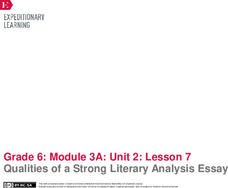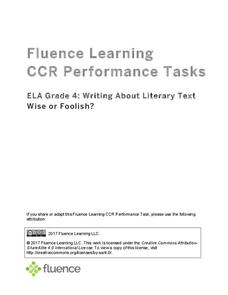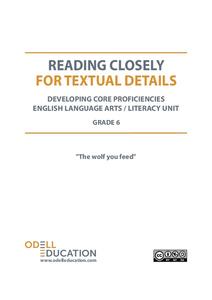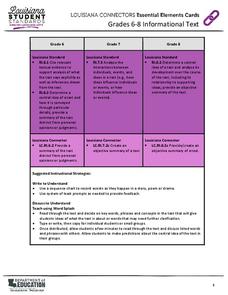Historical Thinking Matters
Rosa Parks: 1 Day Lesson
You've heard of the historical moment when Rosa Parks refused to give up her seat on a bus, but did you know that some historical accounts disagree on where she sat? Investigate this query with your young historians, and practice...
Florida Center for Reading Research
Comprehension: Text Analysis, Fiction and Nonfiction Find
Scholars analyze fiction and nonfiction text and fill in a worksheet detailing the text's title, genre, and reason for its classification.
Mathematics Vision Project
Module 8: Modeling Data
Statistics come front and center in this unit all about analyzing discrete data. Real-world situations yield data sets that the class then uses to tease out connections and conclusions. Beginning with the basic histogram and...
K20 LEARN
OPTIC - A Reading Strategy Recipe: Visual Literacy
A visual literary lesson plan provides learners with OPTIC (Observations, Predictions, Themes, Inferences, Conclusions), a reading strategy to help them understand and interpret visual and written texts. Scholars practice the strategy...
Gilder Lehrman Institute of American History
Document Analysis: The Mayflower Compact
Here's a great comprehension worksheet that models for young readers how to focus on short sections of a complicated text and then to create a summary of the entire document based on their understanding of the sections.
Curated OER
Tangerine: Cubing Strategy
Here's an activity that uses a reading comprehension strategy based on Bloom's taxonomy to focus readers' attention on key passages from Edward Bloor's Tangerine. Worthy of a place in your curriculum library.
EngageNY
Qualities of a Strong Literary Analysis Essay
Read like a writer. Scholars read a model literary analysis in preparation for a similar writing assignment before annotating each paragraph for the gist. Next, pupils devise a list of qualities of a strong literary analysis essay.
Fluence Learning
Writing About Literary Text: Wise or Foolish?
A three-part assessment promotes reading comprehension skills. Class members read literary texts and take notes to discuss their findings, answer comprehension questions, write summaries, and complete charts.
Novelinks
The Graveyard Book: Concept Analysis
Neil Gaiman's award winning children's fantasy novel, The Graveyard Book, is the focus of a literary analysis overview. Those new to the novel can decide whether the book is appropriate for whole-class discussion or as a book circle...
EngageNY
Mid-Unit Assessment: On-Demand Note-Taking, Analysis, and Reflection: “Should We Drill?”
Pupils take a mid-unit assessment, completing a point of view graphic organizer based on an informational article about offshore drilling. Next, learners answer text-dependent and short-answer questions about the text.
EngageNY
Launching the Novel: Character Analysis of Ha
Scholars receive numbers as they work in groups to read Inside Out & Back Again. The instructor calls out specific numbers for readers to share the group's thoughts. Then, they use a model passage to demonstrate the effective actions...
EngageNY
Conducting Research: Analyzing Expert Texts about the Mary River Project
Pupils read informational texts about the Mary River Project, searching for the gist. As they read the expert texts, they complete a graphic organizer to identify and analyze point of view.
Odell Education
Reading Closely for Textual Details: Grade 6
Close reading doesn't mean to literally read text close to your face, but rather to pay attention to particular details in order to develop a deep and purposeful understanding of text. The first part of a five-part resource provides an...
Curated OER
Speak: Questioning Strategy - ReQuest Strategy
The best way to analyze a piece of literature is to ask questions about the characters, plot, and theme. Encourage your learners to stump the teacher with the most difficult questions they can create using Bloom's Taxonomy and various...
Bantam Books
The Tempest: Think-Aloud Annotation
It can be difficult to refer back to a text when analyzing it, so annotation is a great tool for kids to track what they are reading. A thorough and well-organized lesson guides learners through the process of annotating William...
Novelinks
Man's Search for Meaning: ReQuest Procedure Questioning Strategy
As part of a study of Viktor Frankl's Man's Search for Meaning, class members respond to, and craft, higher-level comprehension questions based on passages from the text.
Curated OER
Regarding the Fountain: Questioning Strategy—Cubing
Look deeper into the text with a reading strategy based on asking critical thinking questions. While reading Reading the Fountain by Kate Klise, learners think of questions that help them describe, compare, associate, analyze, apply, and...
Curated OER
The Old Man and the Sea: Questioning Strategies
Readers learn to ask questions about text with an activity based on Ernest Hemingway's The Old Man and the Sea. As they read, class members craft questions based on Bloom's Taxonomy and then find the answers themselves.
EngageNY
Mid-Unit Assessment: Analyzing an Informational Text about a Refugee Experience
Refugee & Immigrant Transitions is an organization that helps newcomers adjust to life in the United States through education and community leadership opportunities. As part of a mid-unit assessment, pupils independently read a...
ReadWriteThink
"Three Stones Back": Using Informational Text to Enhance Understanding of Ball Don't Lie
"Three Stones Back," a passage from Matt de la Pena's best-seller, Ball Don't Lie, allows readers to practice their close reading skills as they compare the passage to an information text about wealth inequality.
New York State Education Department
Comprehensive English Examination: June 2016
Those in positions of authority don't always have the best interest of their people in mind. As part of a sample assessment question, readers must consider how works of literature they read apply to a quote from Edmund Burke—"The greater...
GED Testing Service
A Close Look at Close Reading
Take a close look at this 14-page resource that contains everything you want to know about close reading, from what it is and is not, to suggestions for how to choose a text and craft text-dependent questions that encourage readers to...
Curated OER
Only the Facts
Practice the strategy of summarizing to gain meaning and knowledge from an informational text. Young readers highlight supporting details and main ideas, and then they use this to summarize two articles: "The Great Quake" and "What is an...
Louisiana Department of Education
Essential Elements Cards
Use essential elements cards to help lesson plan! Each card contains an informational text common core standard for grade levels six through eight and suggestions for activities and supports. Cards address skills such as citing textual...

























